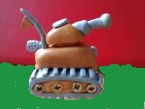warspite1
Posts: 41353
Joined: 2/2/2008
From: England
Status: offline

|
quote:
ORIGINAL: Chickenboy
quote:
ORIGINAL: warspite1
To loki100
The Breda variant was not a British mistake – it was Gamelin’s idea. The problem was – it used up his reserve formation……
To Chickenboy
The problem is that I want Case Yellow written in the almost forensic way that Shattered Sword was written – but then I want every book like that. Clark’s Blitzkrieg is proving to be a very good book – and he stays away from two of the three extremes I mentioned earlier (I haven’t come to the British evacuating without telling the French yet) but…..
….rightly or wrongly I still feel there are unsatisfactory gaps. For example the crossing of the Meuse has been well done, is detailed, balanced and believable in its presentation, but the activities of Army Group B and the Allied First Army Group (inc the Belgians, Dutch and BEF) is a little too high level for my liking – as is the subsequent breakthrough to the coast.
So what do I mean by forensic?
Well one small but important example is the Allied air force situation. The combination of the Allies thinking that Belgium was the key point of attack (and the Germans initially purposely concentrated the Luftwaffe over Belgium to maintain that falsehood), combined with defenders difficulty in knowing where to defend (no radar warning) and what to counter-attack (evidence of German units in the Ardennes were ignored) leads to a situation where the wrong assets were often defending (and attacking) the wrong targets. When the Allies woke up (very late) to the problem on the Meuse, they (mostly RAF in their Blenheim’s and Battles) suffered hideous losses (numbers are given) attacking the crossings that were by now defended by German fighters and a large number of flak batteries. Those losses in turn affected the lack of air activity by the Allies that was possible during the subsequent breakout. Okay. But what about some real detailed numbers? What was available? Where? What was the split of air factors over Belgium compared to the area around Sedan? Is it not possible (maybe not always possible) to get returns for the various squadrons?
So many damn questions……
Yes, but these minuscule details and parsimonious factoids won't help your grand strategic "three questions" that you asked earlier, Warspite1. At some point, you've got to have enough information upon which to base a general assessment of these basic questions. At that point, fringe elements and NEW (or conspiracy) theories won't help all that much.
Shattered Sword did a splendid job of explaining what happened to the Japanese at Midway. True, much of the rationale for their defeat had to do with the ship construction, deck orientation, radio communications (or lack thereof), damage control and-yes-even the number of dollys they had to move ordnance around the deck for reloading. But even this extraordinary insight-this forensic insight-doesn't answer the grand strategic questions that you posed earlier.
So to use the Shattered Sword analogy further (and combine it with your 3 strategic questions), I'd ask:
"Did the Japanese lose Midway because of their crap ship and airframe performance"?
The answer to this is, "No. There were many other factors that explained their loss at Midway. A cumulative level of compounded strategic, tactical and operational errors that spelled their demise. Luck had something to do with it as well." Finding yet one more book detailing some novel tidbit about their ships' or crew shortcomings during the battle won't help me answer this question more fully or change my answer meaningfully. So why bother with y.e.t. a.n.o.t.h.e.r book about the same material, even if it is in a slightly different vein?
warspite1
They weren't questions. They were three common themes that, depending on the author's own individual leanings, are trotted out (with some variation) in books I have read on the subject.
The example questions are just that, an example of the hundreds of questions that help one truly understand what happened (which we know) why (for which there are essentially three themes for those that like things black and white (and for which shades of grey are too complicated)) and intriguingly what, if anything, realistically could have been done to give a different outcome.
< Message edited by warspite1 -- 2/1/2017 7:49:38 PM >
_____________________________
England expects that every man will do his duty. Horatio Nelson October 1805  |
 Printable Version
Printable Version



















 New Messages
New Messages No New Messages
No New Messages Hot Topic w/ New Messages
Hot Topic w/ New Messages Hot Topic w/o New Messages
Hot Topic w/o New Messages Locked w/ New Messages
Locked w/ New Messages Locked w/o New Messages
Locked w/o New Messages Post New Thread
Post New Thread